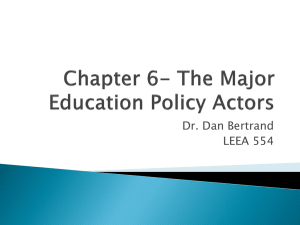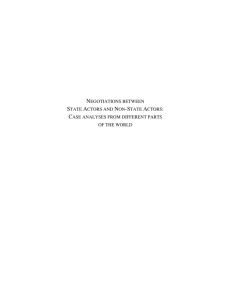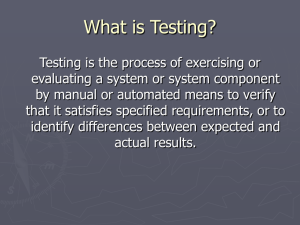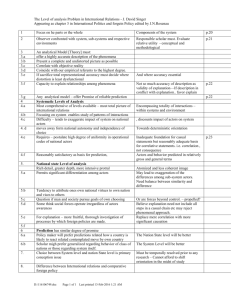Education Policy Actors: Roles & Influences
advertisement
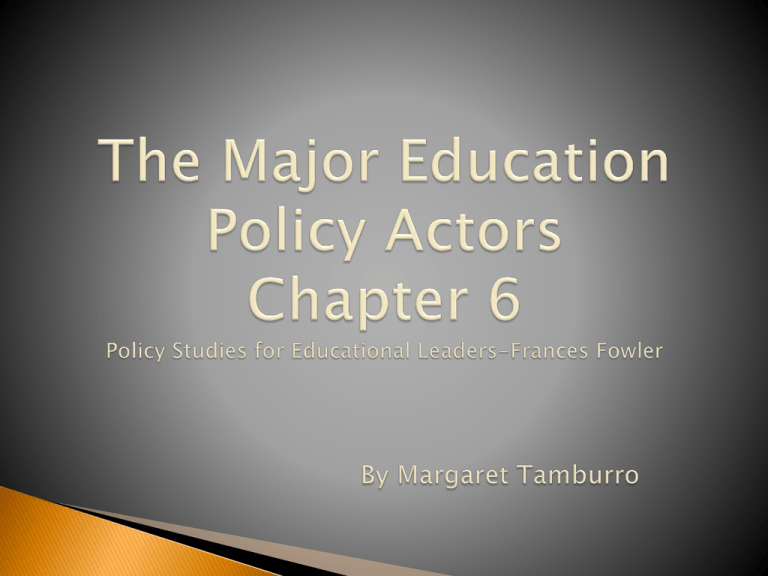
Policy Actors-individuals or groups who are actively involved in the policy process. Federal-State-Local Levels State Level: Why Education is reserved to the states by the Tenth Amendment of the US Constitution. Tenth Amendment protects the citizens rights, It helps to keep balance of power between the federal and state governments. The State Policy Actors are more important than Federal ones regarding Education. Government Actors-Legislative Branch Function: • • • • • The development and passage of statutes, (one type of law.) Review existing laws, to determine if they continue or to amend or repeal it. Approving the governments budget. Establishing task forces or appoint commissions to study a policy issue. Establish special committee to oversee the implementation of a new piece of legislation. Structure: • US Congress and 49 States are bicameral-2 chambers. Senate-smaller chamber • Offices-President, Lieutenant Governor. • House of Representatives-larger chamber (Assembly, General Assembly, House of Delegates.) Offices: Speaker, Majority Leader, Minority Leader • • Committee-perform most of the work of the legislature. (highways, prisons, welfare, education and justice system.) Political Party Caucuses-develops the policy agenda that the party pursues in the legislature. Legislative Staff ◦ Includes-clerical staff, centralized staff agency. Function: ◦ They screen, filter and summarize all materials that reach a legislative office. ◦ Work with the constituents in writing letters and making phone calls to help individual mayors with grants. ◦ Review and analyze budgets. ◦ Legislative research bureau-drafts sample bills and research legal questions. Important Actors: • Educational Committee Develop education laws, review existing legislation and hold hearings on education policy issues. • Finance Committee-state budget in education • Powerful Speaker-impact what education polices are developed. Governors ◦ Institutional Power-the authority granted the governor by the state constitution and state laws. ◦ More powerful if elected by a landslide. ◦ More powerful if they belong to a powerful political party vs a minority party. National Governors Association (NGA) Conducts research, engages in lobbying and provides services to state governments. Education Policy-develops and implements new policies (No Child Left Behind Act of 2011.) Common Core State Standards • State Board of Education (SBE) Responsible for K-12 and vocational education. Tasks: • Developing/approving- rules and regulations for education laws. • Developing certification requirements K-12 teachers and administrators • Approving and monitoring assessment programs • Deciding on HS requirements for graduation • Determining accreditation standards. Executive Positions: • • • • • • • Chief State School Officers (CSSO) A public official charged with the supervision of public education. (Superintendent of Public Instruction, the State Superintendent of Schools or the Commissioner of Education.) State Departments of Education (SDE) Important in the Education Policy Process. Provide Education committees with data. Provide the assessments of the impact of a proposed policy. Detail the rules and regulations during implementation of a new law. Oversees and monitors the compliance of a new law. May ignore or block legislation, or it may opt to dilute the rules when writing them. State Court Systems ◦ 2 tiered systems-Trial courts and Supreme court (11 States) ◦ 3 Tiered System-Intermediate Appellate Court, Trial and Supreme. (39 States.) ◦ Higher courts take cases only on appeal from lower courts, rule on the correctness of the lower courts. ◦ Judges can have influence over education policy. Local Boards of Education Play a central role in education policy making. State-sets curriculum standards, requiring students to pass state tests, data collection and publish state report cards. Tasks: • • • • Develop policies suited to their district. (Ex. State requires minimum of 180 days, but local board determines when school begins, ends and vacation dates. Implementation of state-mandated policies. Local Boards can influence the success or failure of state policy by the way they implement them. (Local Board can decide how much emphasis to place on the new policy.) Superintendent ◦ Appointed by the School Board. ◦ A former teacher and administrator. ◦ Crises for SuperintendentsWhy: ?? Age is increasing Shorter length of time in office than used be. Increased pressure from the state governments to implement mandates that usually are unfunded. Interest Groups-What They are and What They Do An association of individuals or organizations that attempts to influence public policy in its favor. Education Interest Groups National Education Association (NEA) 3.2 million members American Federation of Teachers (AFT) 1.3 million members National School Boards Association(NSBA) 90,000 members American Association of School Administrators (AASA) 13,000 members ◦ Parent Teacher Association (PTA) 5 million members. ◦ ◦ ◦ ◦ Non-Education Interest Groups ◦ Business Lobby-most influential policy actors in every state capital. ◦ Ethnic Based-usually interested on policy relating to them. ◦ Religious Based Examples : Chamber of Commerce, trade associations, service industries, Farm Bureau, National Association of Manufacturers. Children’s Defense Fund Conference of Catholic Bishops, Christian Coalition or the Anti-Defamation League. Single Issue Ideological Groups such as anti-abortion organizations. Policy Networks Groups interested in education policy. They coordinate a wide range of efforts to influence policy. Example: Education Commission of the State (ECS) (1966 Mission to help state leaders identify, develop, and implement public policy for education.) Children’s Defense Fund-purpose to be strong, effective, independent voice for all the children of America. Think Tanks-Policy Planning Organizations ◦ Gather data about public policy issues and communicate their findings to the government. ◦ Decide what problems to study, select sources of information about them and summarize their results of their research, than decide which to consider. Think Tanks are the most important actors in the policy process. Center for Education Policy, Consortium for Policy Research in Education, Carnegie Corporation of New York, Rockefeller Foundation. Outspoken advocates of a specific policy proposal. Speak up and lobby for a specific policy. Not all work for the Think Tanks, some may be government employees, politicians or academics. Those funded by Think Tanks play a role in education policy innovations. Policy entrepreneurs play an important role in getting the ideas onto government agendas. Report on policy issues and some stages of the policy process, but are also important actors. Print News Agencies Broadcast Internet On-Line Services Media agenda-leads the general public and political figures to become so concerned that they insist it be addressed. Public Agenda-General public-little interest or great interest. News Agencies: Internationally: Provide news stories, background information, and pictures to media outlets around the world. ◦ Associated Press, Reuters and Agence France Preese. National: Television channels, Online services. Radio has a dual focus-national and local. To be effective with your Policy Actors, you need to know : Who they are? Where they can be reached? Who should be contacted about specific issues? Locating Elected Government Officials • District office, telephone book, public library, the internet, League of Women Voters, Politicians’ offices, newspapers Identifying Appointed Officials and Groups • State Departments of Education directorythey publish a handbook for administrators in the state. (includes SDE, CSSO, SBE.) • Telephone Book of State Capital • Organizational Headquarters-flyers, brochures or searching their website. Identifying Policy Planning and Related Organizations • Recent policy reports, Newspapers, Education week and the internet. To follow state education policymaking: ◦ Newspapers ◦ Newspapers published in the state capital and any prestige newspapers : New York Times, the Philadelphia Inquirer or Los Angeles Times. ◦ Monitor Interest Groups’ websites-NSBA, NEA, AFT ◦ Hot Lines- to hear recorded messages of status updates on pertinent bills. WWW.USA.Gov State, Local and Tribal Governments Contact Federal Government Contact Elected Officials Interest Groups Subscribe to get Email Updates from local officials to stay current on issues affecting education.
